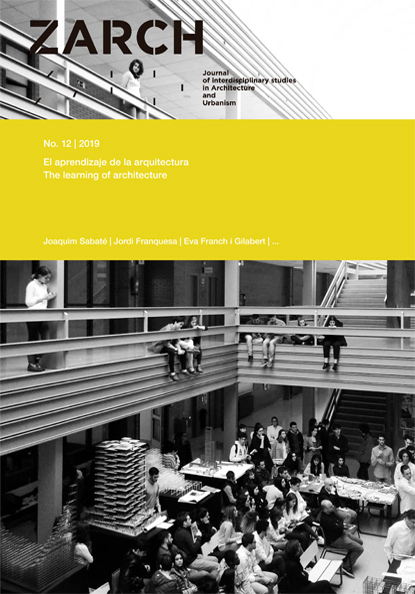From collaborative practices to the classroom as a network laboratory
DOI:
https://doi.org/10.26754/ojs_zarch/zarch.2019123559Keywords:
Learning, Collaboration, Peertopeer, Experience, Network, TacticAbstract
In the last 25 years, a number of radical transformations have taken place in the world and in architecture. These have put in crisis not only the professional paradigm of our discipline, but also, consequently, its educational model. Internet, the real estate and educational bubbles, and a recession and transformation of the economy in Europe within a hyperconnected world, have favored the emergence of other models of professional exercise which have anticipated potential revolutions in the teaching-learning duo.
In the Spanish context, the emergence of a collective architecture scenario between 2001 and 2010 is relevant. Within these practices, echoes have been detected with global phenomena in the spheres of innovation and open culture; at the same time, these practices imply per se contexts where collaborative production and learning take place in a singular and reciprocal way. This article traces possible methodological transfers between these collective environments and a new university classroom model that enhances teamwork. The class understood as a community with connections between each other and to contemporary reality and university experience as a laboratory. The student is protagonist accompanied within a network learning experience.
Downloads
References
Arquitectura Viva. 2012. Diccionario de colectivos. 48 equipos en España: una selección y un mapa. Arquitectura Viva 145 (octubre-noviembre): 22-65.
Bauman, Zygmunt. 2001. La sociedad individualizada. Madrid. Cátedra.
Bauman, Zygmunt. 2007. Los retos de la educación en la modernidad líquida. Barcelona. Gedisa.
Bourriaud, Nicolas. 2009. Postproducción: la cultura como escenario, modos en que el arte reprograma el mundo contemporáneo. Adriana Hidalgo Editora.
Chinchilla Moreno, Izaskun. 2015. La Estructura de la Revolución Ecológica en Arquitectura. Tesis Doctoral. ETSAM UPM.
Di Siena, Domenico. 2012. Creatividad horizontal. Redes, conectores y plataformas. Arquitectura Viva 145 (octubre-noviembre): 20-21.
Díaz, Rubén; Freire, Juan; Lamb, Brian; Martín Barbero, Jesús; Lafuente, Antonio; Wesch, Michael; Echeverría, Javier; Zaldíbar, Jon; Reig, Dolors; Ito, Mizuko; Jiménez, Pedro; Piscitelli, Alejandro. 2012. Educación Expandida. Sevilla: Zemos98.
Durand, Jean Nicolas Louis. 1802-1805. Précis des leçons d'architecture données à l'ecole polythechnique.
Estalella, Adolfo. 2015. Ciudad Escuela. Un ensayo de pedagogía (urbana) en beta. Conferencia pronunciada en el II Congreso Internacional del Maestro Investigado.
Estalella, Adolfo. 2015. Colectivos de arquitectura: otra sensibilidad urbana. Artículo del blog Prototyping. http://www.prototyping.es/destacado/colectivos-de-arquitectura-otra-sensibilidad-urbana
Farías, Ignacio; Wilkies, Alex. 2015. Studio Studies: Operations, Topologies & Displacements. Routledge.
Franch, Eva; Miljacki, Ana; Mínguez, Carlos; Reidel, Jacob; Schafer, Ashley. 2017. OfficeUS. Manual. Lars Müller Publishers.
Goberna, Cristina; Grau, Urtzi. “What Kinds of Copies?(s)”. Log 31 (spring-summer 2014): 139-142.
Himanen, Pekka. 2002. La ética del hacker y el espíritu de la era de la información. Destino Libro.
Johnson, Steven. 2010. Where Good Ideas Come From. Ed. Riverhead.
Latour, Bruno; Woolgar, Steve. 1979. Laboratory Life: The Construction of Scientific Facts. Princeton University Press.
López Munuera, Iván. 2012. Notas sobre el “bum”: Los colectivos españoles, un ecosistema plural. Arquitectura Viva 145 (octubre-noviembre): 15-19.
Mallo, María; Martín, Irene; Peñalba, Ana. 2013. “Comunidades de aprendizaje en entornos colectivos”. Artículo presentado en las Jornadas Científicas Arquitectura, Educación y Sociedad.
Miessen, Markus; Basar, Shumon. 2009. ¿Alguien dijo participar? Barcelona. DPR.
Miessen, Markus. 2014. La pesadilla de la Participación. Barcelona. DPR.
Muir, Tom; Rance, Brian. 1995. Collaborative practice in the built environment. Red Wheel/Weiser.
Nieto Fernández, Enrique. 2012. Prescindible organizado: Agenda docente para una formulación afectiva y disidente del proyecto arquitectónico. Tesis Doctoral. Universidad de Alicante
Ribot, Almudena; Espinosa, Enrique; Altuna, Gaizka; De Abajo, Begoña. 2017. “Tácticas proyectuales colaborativas”. JIDA'17. Jornadas de Innovación Docente en Arquitectura 2017.
Ribot, Almudena; Espinosa, Enrique; Altuna, Gaizka; De Abajo, Begoña; García-Setién, Diego; Soriano, Federico; Urzáiz, Pedro; Gil, Eva. 2018. Tácticas proyectuales colaborativas: Manual para anticipar dinámicas colectivas profesionales dentro del aula universitaria. Madrid: UPM.
Sennet, Richard. 2012. Juntos. Rituales, placeres y política de cooperación. Barcelona. Anagrama.
Solé, Ricard. 2009. Redes complejas: del genoma a internet. Barcelona: Editorial Tusquets.
De Ugarte, David. 2009. Filés: Democracia económica en el siglo de las redes. Barcelona: Ediciones El Cobre.
De Ugarte, David. 2010. Los futuros que vienen. Madrid: Sociedad Cooperativa del Arte de las Cosas. Biblioteca de las Indias.
Ulargui Agurruza, Jesús; De Miguel García, Sergio. 2017. “Aula abierta”. JIDA'17. Jornadas de Innovación Docente en Arquitectura 2017.
Urrutia, Juan. 2008. El capitalismo que viene. Barcelona. El Cobre Ediciones.
Vasari, Giorgio. 1550. Las vidas de los más excelentes pintores, escultores y arquitectos.
Vercauteren, David; Crabbé, Olivier; Müller, Thierry. 2010. Micropolíticas de los grupos: Para una ecología de las prácticas colectivas. Madrid. Traficantes de sueños.
Vygotski, Lev Semiónovich. 1934. Pensamiento y Lenguaje.
Wenger, Etienne. 2001. Comunidades de práctica. Aprendizaje, significado e identidad. Madrid. Paidós.


